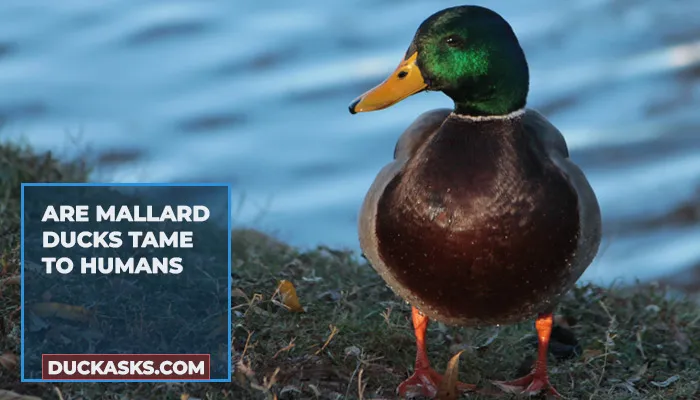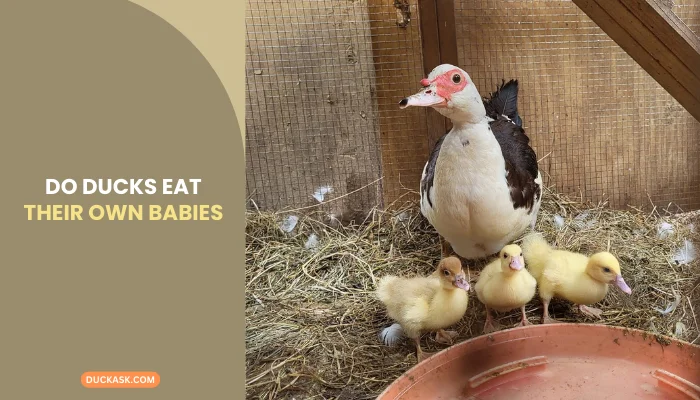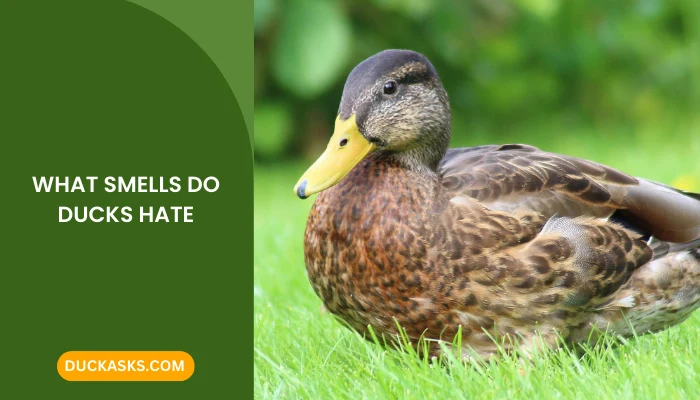Are Ducks Blind at Night?
Ducks are fascinating creatures. Their life and habitat build various curiosities within people. As they can walk, swim, and if needed, sometimes fly too.
But apparently, their activities are usually restricted to only the daytime when there’s enough light. And so, it often makes people ask, are ducks blind at night?
Even though they see quite well in the dark, they choose to remain less active. Actually, this happens because their behavior and visual prowess undergo significant changes in dark conditions due to their crepuscular nature.
Excited to know more about their behavior at night? Just stay with us till the end of the article.
Do Ducks Have Good Night Vision?
Indeed, ducks have better vision than us. Don’t believe me? You might not know, but they have higher rod cells in their eyes than us. The extra rod cells make them visualize better at night.
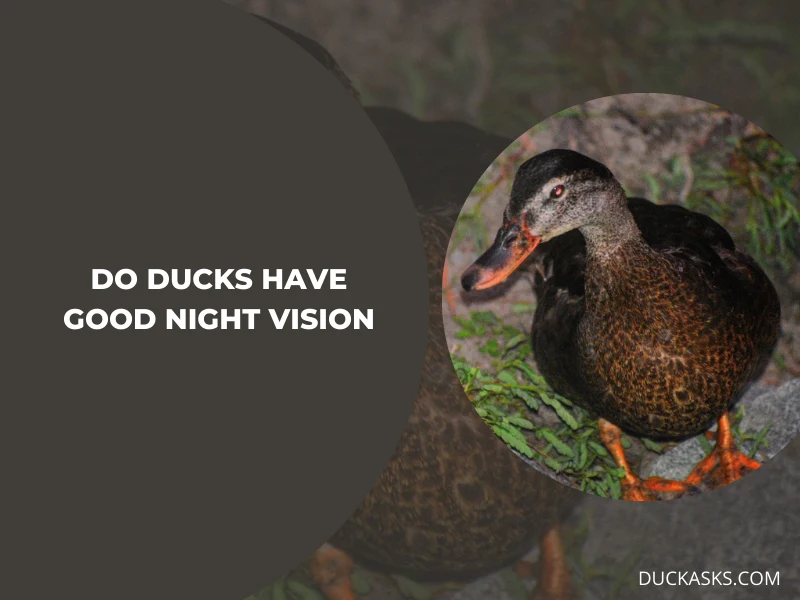
However, ducks are not nocturnal creatures like cats or owls. They are more crepuscular in nature. It means they are much more active in the day and dawn. Their low-light vision helps them detect food in intermediate lighting during the dawn.
They are most active during about 30 minutes surrounding dawn (just before sunrise) and 30 minutes from dusk (just after sunset). The exact time differs with the location and climate.
Therefore, even though ducks have good night vision, it is limited compared to other nocturnal animals. [Reference]
What Do We Know About Duck Sight?
If you want to understand how duck sight really works, you need to dive into their unique components of vision. Here’s what can help you –
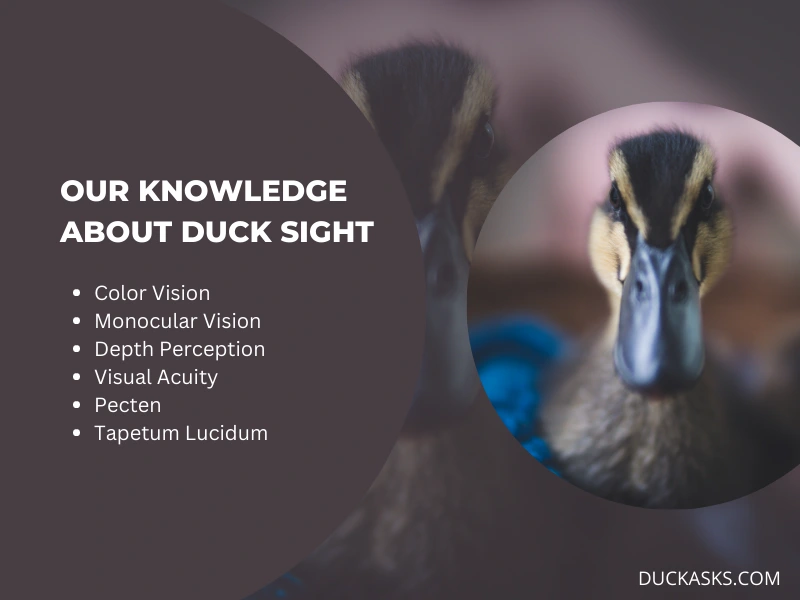
Color Vision
The color vision of ducks is quite as good as humans. They have three color receptors, collectively known as cones, in their eyes. And they help them perceive a wide range of colors which is helpful for their mating and survival.
Monocular Vision
Ducks possess monocular vision, which refers to the vision that does not overlap the area of one eye with the other. This makes ducks have a wider panoramic vision of about 340 degrees horizontally.
Depth Perception
Well, the depth perception of ducks is not too impressive, they judge distances using visual cues like motion parallax and size scaling. This means they can see the objects near them much larger and faster than objects farther.
Visual Acuity
They have good visual acuity, for which they can see fine details of an object pretty flawlessly. Due to this ability, ducks bear a very sharp and clear vision.
And so, with the help of it, ducks efficiently find food, navigate predators, and recognize other environmental factors.
Pecten
Ducks have a layer of membrane called pecten in their eyes. It delivers extra oxygen and nutrient to their eyes, enhancing their visual performance in low-light conditions.
Tapetum Lucidum
This refers to a reflective layer behind the retina that most nocturnal and crepuscular animals like ducks possess. It gives the eyes a second chance to capture available light by reflecting and reusing light that passes through the retina.
This contributes to improved night vision by reflecting and reusing light that passes through the retina. Deer, cats, dogs, cattle and horses have this ability besides mallard ducks.
How Do Ducks Navigate in the Dark?
Apart from their incredible night vision, ducks have various other adaptive characteristics as well that help them navigate quite well during the dark and dim.
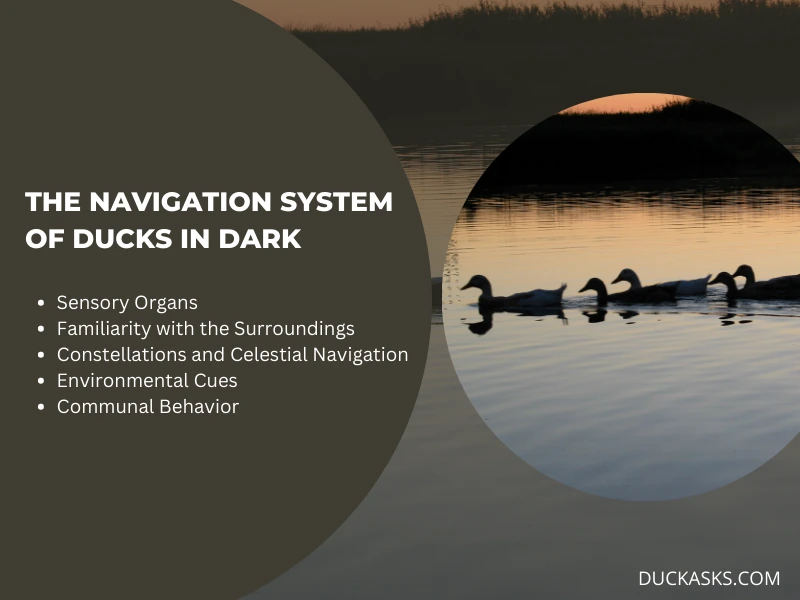
Below is a list of a few very interesting ways that contribute to ducks navigating at night.
Sensory Organs
Along with their eyesight, ducks also rely on other sensory organs, such as their excellent sense of hearing and touch, to navigate in the dark.
Their hearing allows them to detect sounds and movements of potential predators or prey and their sensitivity helps them locate food even in dark waters.
Familiarity with the Surroundings
Ducks are pretty good at remembering sites that are familiar to them. Such as they remember all necessary details and routes to their nesting site, swimming site, and other landmarks important to them.
This is also extremely helpful for them to move effortlessly even when visibility is reduced during the night.
Constellations and Celestial Navigation
Not all ducks, but many ducks, like mallards, navigate during the night with the help of constellations. They are able to recognize certain star patterns or the position of the moon to orient themselves.
It works like a clock for them to know how deep the night is and in which direction they should be moving.
Environmental Cues
Besides celestial navigation, ducks can pick up various environmental cues to navigate. Such as the flow of water, the direction of wind, and the orientation of vegetation are enough for ducks to judge their surroundings.
These cues help them with the information necessary for their smoother movement and navigation.
Communal Behavior
Ducks are social creatures and they usually like to move in groups both during the day and the night. This makes their navigation process much easier.
All they do is follow each other! They make a line or V form and maintain that while moving in a group so that they don’t get lost by chance.
How Do Ducks Behave in Complete Darkness?
Ducks have better night vision than many other animals, no doubt! But don’t mistake it with thinking that they are comfortable with moving around during the night time.
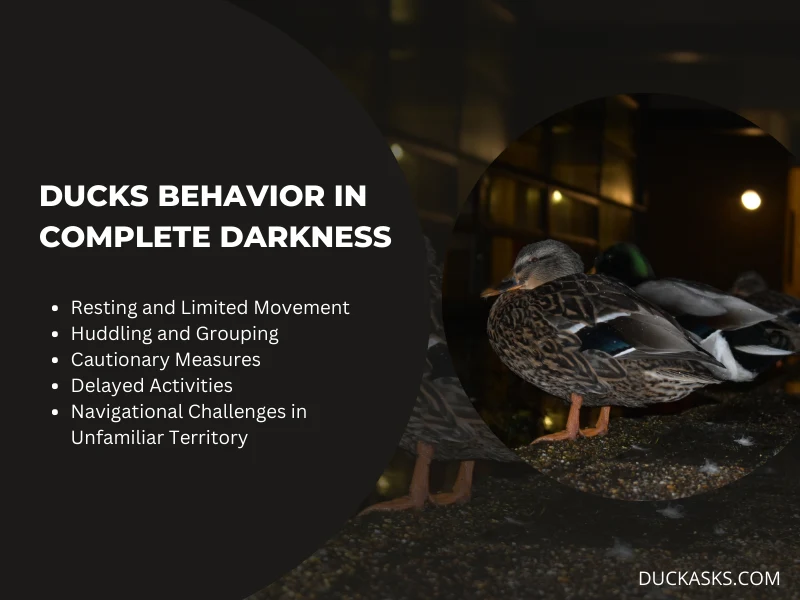
Darkness is out of the comfort zone of ducks. So, the ducks’ behavior completely changes in darkness. They generally show the following behavior in the dark –
Resting and Limited Movement
Darkness usually reduces the activity of the ducks significantly. So, they take shelter in a safe and warm spot until it lights again in the morning. Their reduced movement helps them avoid potential threats that they can’t detect in the dark.
Huddling and Grouping
During the dark, ducks prefer to stay in a group huddling with each other for a safer and warmer night environment. It ensures them with a sense of security and relief.
Cautionary Measures
In a dark environment, ducks get extra cautious about their potential dangers and predators. And so, they are much more alert and reactive to changes in their environment in the dark.
Delayed Activities
Ducks withdraw their necessary survival activities like feeding and foraging when adequate light is not available. They opt for a quite delayed activity pattern in the dark.
Navigational Challenges in Unfamiliar Territory
It gets a bit difficult for the ducks to navigate territories they never stepped on before as they rely on their memory and recognition of environmental cues.
Conclusion
I hope you aren’t still wondering whether are ducks blind at night. As you now know, they have better night vision than us. Now, imagine flaunting this knowledge with your friends.
They are not going to believe you, right? So, just prove yourself right by sharing this article with all your skeptic friends on Facebook, Twitter, and Pinterest.
References:
- https://www.ducks.org/conservation/waterfowl-research-science/understanding-waterfowl-night-moves
- https://www.tn.gov/twra/twra-outdoors-blog/2019/10/15/the-etiquette-of-duck-hunting.html


